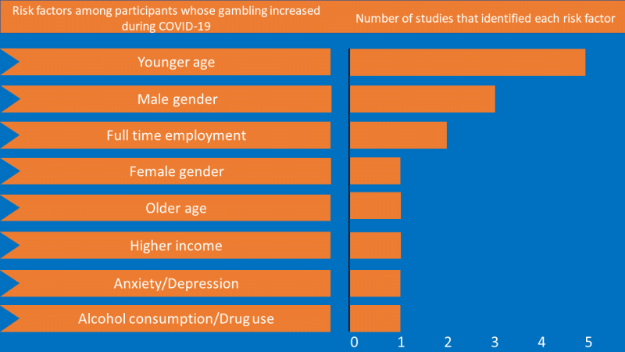The WAGER, Vol. 26(9) – Gambling during COVID: The impact of COVID-19 on gambling behavior and gambling-related problems
Editor’s Note: Today’s review is part of our month-long Special Series on Managing Addiction during COVID-19. Throughout September, The BASIS is highlighting how the COVID-19 pandemic has impacted people managing addiction. This Special Series is generously sponsored by the Greater Boston Council on Alcoholism.
The COVID-19 pandemic has permeated just about every area of our society, causing massive changes in our world. Some changes—like working remotely and staying home instead of going to sporting events, bars, and casinos—might outlast the virus. Certainly during the first year of the pandemic, people couldn’t gamble in land-based venues even if they wanted to. It’s important to understand how people’s relationship with gambling changed during COVID because some of these changes might be long lasting. Therefore, this week, as part of our Special Series on Managing Addiction during COVID, The WAGER reviews a study by David Hodgins and Rhys Stevens on the impact of COVID-19 on gambling and gambling-related problems.
What was the research question?
How has the COVID-19 pandemic impacted gambling behavior and gambling-related problems?
What did the researchers do?
The researchers searched several online databases for peer-reviewed scientific articles and other relevant published works (e.g., research reports) that examined changes in gambling and risk factors for gambling-related problems during the COVID-19 pandemic. Their criteria for selecting articles in the study included: (1) the examination of individual gamblers, (2) assessment of the impact of COVID-19 on gambling, and (3) publication in English after March 2020. Seventeen distinct articles were located that fit these inclusion criteria.
Author’s notes, Dr. David Hodgins: “I was very surprised at the number of studies that have addressed this issue, given that it is still emergent. Sometimes as researchers we struggle to generate evidence in a timeline that allows it to impact policy and practice in a meaningful way. With this issue, the evidence points to the group of individuals that are particularly vulnerable to increasing gambling and gambling-related harm.” (We thank Dr. Hodgins for sharing his personal thoughts about the article.)
What did they find?
The articles were limited geographically to middle- and upper-income Western countries, though they included a variety of recruitment methods and recruited participants from a variety of different population groups within those countries. Most (65%) of the studies were cross-sectional and 35% were longitudinal, and all of the studies used online surveys as one of the data collection approaches. While changes in participants’ gambling behavior varied across studies, all 17 studies showed an overall decrease in gambling behavior, measured as reduced gambling frequency and/or money spent on gambling. Though only two studies investigated the causes behind this decline, the most common in descending order were: (1) financial reasons, (2) absence of live sports, (3) not wanting to gamble around family, (4) thinking they were gambling too much, and (5) shopping less overall.
On the other hand, some individuals increased their gambling behavior, which can lead to increased risk of gambling-related problems. Several risk factors were associated with increased gambling behavior (See Figure).

Figure. Number of studies that found certain characteristics and behaviors (i.e., risk factors) of subgroups of individuals who increased their gambling during the pandemic. The total number of studies included was n = 17. Click image to enlarge.
Why do these findings matter?
These findings are important because they indicate that gambling trends during the current COVID-19 pandemic situation are complicated and may be worsening for some individuals as a result of psychological and financial stress. Online gambling—which appeared to have increased in popularity in some subgroups—might be especially problematic for some gamblers due to its relative lack of constraints (e.g., 24/7/365 availability) and the wide variety of gambling products available. For these reasons, it is important that anyone who gambles uses safe gambling habits and is aware of educational and help resources that can help them manage their gambling, such as self-limitation and self-exclusion tools offered by many gambling operators.
Every study has limitations. What are the limitations in this study?
Many of the studies in the literature review had their own limitations such as the sampling methodology, including using convenience samples in online surveys, which might not be representative of their target population. Additionally, this study only provides a snapshot of where we currently are, in the midst of the COVID-19 pandemic, and does not provide any data on post-COVID-19 trends in the US or internationally.
For more information:
Individuals who are struggling with problem gambling may find support at the Massachusetts Office of Problem Gambling Services or the National Council on Problem Gambling. Additional resources can be found at the BASIS Addiction Resources page.
— John Slabczynski
What do you think? Please use the comment link below to provide feedback on this article.